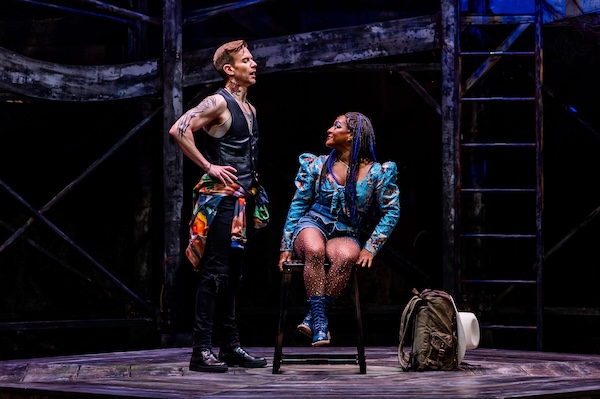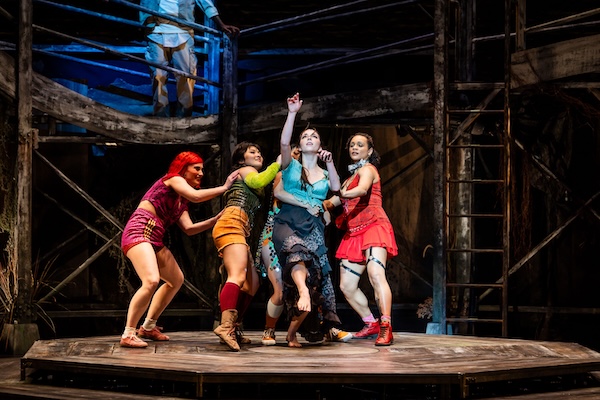Theater Review: “Carousel” — One More Spin of the Wheel
By Robert Israel
Despite all the Boston Lyric Opera pageantry and talent, Carousel‘s trip to the 21st century turns out to be bumpy.
Carousel, music by Richard Rodgers, book/ lyrics by Oscar Hammerstein II. Directed by Anne Bogart. Presented by Boston Lyric Opera. Orchestra conducted by David Angus. At the Emerson Colonial Theatre, 106 Boylston St., Boston, through April 13.

Edward Nelson as Billy and Brandie Sutton as Julie in Boston Lyric Opera’s Carousel. Photo: Nile Scott Studio
Boston Lyric Opera’s production of Carousel, now commandeering Boston’s Emerson Colonial Theatre, proffers visual and aural stimuli aplenty. A sprawling cast bursts forth from multiple levels; they sing, dance, and acrobatically hurl themselves about Sara Brown’s wondrous and inspired set. Attired in Haydee Zelideth’s silky rainbow costumes, which shimmer as they razzle-dazzle, one imagines, if they were paraded outside the theater’s doors, their collective energy might just light up Boylston Street and most of Boston Common. The orchestra, under David Angus’s steady baton, is raised from the orchestra pit to seat-level and it delivers Richard Rodgers’s score faithfully and melodiously.
Despite all the pageantry and talent, crucial questions remain. What is the relevance of a musical whose book and lyrics explore time-honored male/female social roles? In what ways does material redolent of stubborn tradition resonate, in a meaningful way, for today’s audiences? Those difficulties were not lost on director Anne Bogart, who poses another question in her program notes, entitled “The Thrill of a Chestnut”: “Who needs to perform this play now and who needs to hear it?” Her response: “The aim is to tap into the power of the original… In our version … a group of refugees arrive … to perform the play, seeking to gain access and acceptance.” She concludes that “It is my hope that the original power and alchemy of Carousel takes hold.”
That’s an admirable approach to update a play first performed during the waning days of WWII in a three-week tryout at the Colonial eight decades ago with John Raitt — the late father of pop/blues performer Bonnie Raitt — who played Billy Bigelow, and Jan Clayton, who played his love interest Julie. But the plight of refugees did not then and does not today command the same attention as the fate of star-crossed lovers.

Louise (Abigail Marie Curran, in blue) and dancers (l.-r.) Sabrina Lobner, Olivia Moon, and Jay León in Boston Lyric Opera’s Carousel. Photo: Nile Scott Studio
Compounding the pull of the past are the lyrics which, to today’s listeners, come off as cumbersome. Contemporary ears are attuned to briefer, punchier lyrics: our American vernacular revels in snappier, as well as coarser and shorter, phrases. The lyrics in this show take the form of long sentences peppered with awkward patches throughout. Bogart insists that “we are not changing or eliminating any of the words or music,” but, truth be told, some editing/updating here would help — mightily.
What we are left with is not relevance but an evening of nostalgia that can be enjoyed for its impressive performances and the aforementioned set, costumes, and orchestration. Edward Nelson shines as Billy, a troubled roustabout who is prey to his impulses; the performer’s musical chops and athleticism are a marvel to watch. That said, there is a noticeable lack of romantic chemistry between Billy and his love-interest Julie, played by Brandie Sutton. Sutton radiates a range of believable emotions, but alongside Nelson, she struggles to suggest the attraction that brought them together. Jamie Barton is radiant as Nettie Fowler, not only because of her operatic voice but her affecting presence as she is called on to lead the ensemble as it rallies and disperses. And Abigail Marie Curran, who plays Louise (the daughter of Billie and Julie, introduced to us in Act II as a young adult), is astounding, not only for her skills as a dancer, but how powerfully she projects the role’s innocence.
Most of the tunes in the show do not have the takeaway power of the standard “You’ll Never Walk Alone,” which has been adopted by soccer teams overseas, or the snippet of a carousel song that the late composer Robbie Robertson inserted into a musical number in the film The Last Waltz (Martin Scorsese’s film about the rock group The Band).
Overall, one leaves the Colonial having experienced a heralded musical that contributed melodies to the Great American Songbook — “If I Loved You,” “June Is Bustin’ Out All Over”, “You’ll Never Walk Alone” — but whose trip to the 21st century turns out to be bumpy.
Robert Israel, an Arts Fuse contributor since 2013, can be reached at risrael_97@yahoo.com.
Tagged: "Carousel", Anne Bogart, Boston-Lyric-Opera, David Angus
